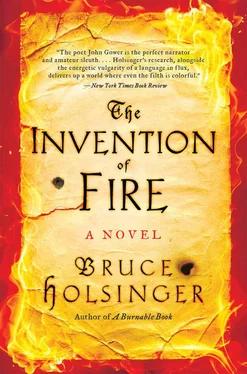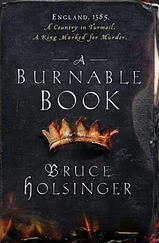Bruce Holsinger - The Invention of Fire
Здесь есть возможность читать онлайн «Bruce Holsinger - The Invention of Fire» — ознакомительный отрывок электронной книги совершенно бесплатно, а после прочтения отрывка купить полную версию. В некоторых случаях можно слушать аудио, скачать через торрент в формате fb2 и присутствует краткое содержание. Год выпуска: 2015, Издательство: HarperCollins, Жанр: Исторический детектив, на английском языке. Описание произведения, (предисловие) а так же отзывы посетителей доступны на портале библиотеки ЛибКат.
- Название:The Invention of Fire
- Автор:
- Издательство:HarperCollins
- Жанр:
- Год:2015
- ISBN:нет данных
- Рейтинг книги:3 / 5. Голосов: 1
-
Избранное:Добавить в избранное
- Отзывы:
-
Ваша оценка:
- 60
- 1
- 2
- 3
- 4
- 5
The Invention of Fire: краткое содержание, описание и аннотация
Предлагаем к чтению аннотацию, описание, краткое содержание или предисловие (зависит от того, что написал сам автор книги «The Invention of Fire»). Если вы не нашли необходимую информацию о книге — напишите в комментариях, мы постараемся отыскать её.
The Invention of Fire — читать онлайн ознакомительный отрывок
Ниже представлен текст книги, разбитый по страницам. Система сохранения места последней прочитанной страницы, позволяет с удобством читать онлайн бесплатно книгу «The Invention of Fire», без необходимости каждый раз заново искать на чём Вы остановились. Поставьте закладку, и сможете в любой момент перейти на страницу, на которой закончили чтение.
Интервал:
Закладка:
“A fair welcome to our humble alehouse, Master Snell,” said Stephen weakly. He retook his seat.
Snell considered him for a while. Then he leaned forward, his voice lowering as the tavern din reached a peak. “Here is why I have come, Marsh.” He pushed a chunk of wood and metal across the board, then emptied his jar in one long swallow. Stephen hefted the object. It was heavy in his hand, a darkened length of iron between fixed bands, a stubbed tube sawed from a longer rod. The wooden piece resembled a barrel stave, though it was the length of a forearm rather than the height of a boy. Stephen brought the object to his nose, catching the distinctive whiff of sulfur. He stroked the wrought metal, then turned the object over in his palm.
He set it back on the stew table. “What is this?”
“A chamber, stock, and firing hole, hacked from one of our small guns,” said Snell, leaving the thing in front of Marsh. “It’s an ugly thing, inefficient and clumsy. I would like you to design and fashion a better one, with more reliable results. These keep misfiring, or worse, exploding on my men.”
Stephen looked down at the piece and ran his finger along the seam. “A better hammer weld would improve it, I’d think. Hot work, but not complicated.”
“We need these devices to be lightweight and made to survive a dozen rounds at the least,” said Snell. “Uniform in their shape, so they can be moved down a line from hand to hand. Cast of bronze, perhaps. Strength, yes, but also flexibility.”
Stephen thought about it. “Why not keep this in the Tower? You have your own metalers over there. Michael Colle, Herman Newport. I’ve trained some of those fellows myself, apprenticed with them before I got my guild key.” Along with its outside commissions, the royal armory had long employed its own smiths and founders and farriers, lines of men whose days were given over to the forging and pounding of guns and shot, boltheads and engines of war, infantry plate and helms and horses’ shoes.
Snell lifted, then dropped the awkward lump of metal and wood. It hit the scarred surface of the table with a dull thud and took a half roll. “This is a special job, Marsh. A particular job, you see. I am concerned about the privity of the armory. I want to have this done outside, and discreetly, so as not to arouse suspicions.”
“Whose suspicions?”
“None of your concern.”
“With respect, Master Snell, I am not a fool,” Stephen said, leaning in. “You are asking me to risk my position at the foundry, my guild key, my livelihood. I would have to make these devices right beneath the widow’s nose, yet behind her back.” He thought of Hawisia, the glimmer of suspicion in her eyes whenever she looked at him. “Stone’s is her foundry, the whole of it. Every hammer, every awl and anvil, every ingot of tin, every barrel of wax, every mound of clay. I cannot risk my position there, nor earn more of her fury than I have these four months since the master’s death.”
“Your devotion to the widow is admirable,” said Snell with a mocked sincerity. “Yet there are higher purposes than loyalty to a craft. There is your nation to think of, and your king. We are after something new at the Tower, Marsh. Something . . .” The armorer’s eyes narrowed as his tongue sought out the hard spots on his upper lip. “Something more efficient . A maximum of delivery with a minimum of effort. Do you see?”
Stephen frowned. “Larger guns, then?”
Snell’s nose twitched, and a corner of his mouth turned up. “It’s smaller guns we are after. Smaller, quicker to load, more portable, more-” He squinted, as if looking across a great distance. “More deadly. And thus more efficient.”
“Efficient?”
“Efficient,” said Snell with a tight smile. “It’s the common word of the season at the Tower and among the king’s familia, from top to bottom. After what happened in Edinburgh last year, who could wonder that the king’s army is looking for better ways to fight and happier machines of war? We chased the Scots from town to town and pile to pile but they wouldn’t engage, nor was our army swift enough to split up and catch them, what with all the equipment and baggage in tow. So now here we are, looking our own invasion in the nose, and the talk is all of effectiveness of operation. Do more killing, we tell the cavalry and infantry alike, but with fewer men, fewer arrows, fewer bolts. More slaughter, we tell them, but with less treasure, less shot, less powder.”
“And less gun,” Stephen mused.
“And less gun,” said Snell, his voice lowering to a gritty whisper. “Now you are seeing it, as I rightly knew you would. You are a man of solutions, Marsh. If we can find the right alchemist with his tinctures or the right priest with his sacraments, why, we should be able to shrink a gun to the size of a ram’s cock. I am not concerned with the look of these weapons, you understand. They needn’t be beautiful things, like your hinges and such. Deadly efficiency is what we are after here.”
Stephen stared at the wall behind Snell, and a procession of guns marched across his inner sight, great cannon leading the small, the pots-de-fer before the bombards before the ribalds before the culverins, throwing their balls and bolts to every side. Less gun. A stirring goal; an attainable one. He knew little of gunpowder and shot aside from the pieces he’d seen wheeled to the gates and stationed beneath a few sentry towers along the walls, and his sole work on artillery was represented in the few large guns founded for the Tower before the passing of Master Stone.
Yet Stephen could already imagine ways that might be discovered to render such devices more efficient, to constrict their girths, lessen their lengths, improve their firing, and now that the notion had entered his mind he yearned to get his hands on one of them and apply his own skills to the problem, to gauge for himself the intricate balances of weight and mass, force and propulsion guiding these wondrous instruments slowly multiplying across the battlefields of the world.
Stephen sat up straighter, feeling a need to impress the armorer. “Efficiency and beauty are hardly natural enemies,” he said, “and weight can be compensated for by other means.”
Snell raised his heavy brow. “Go on.”
“A simple solution to an unknown problem. A gun is no different from a hinge. The sorts of things I found and smith and repair at Stone’s-hinges, buckles, coffers, gates, bells, to say nothing of clocks and the like-they are the fittingest prologue one could imagine to the new guns your men are smelting and forging behind those walls. And no one in London melts and bends and tinkers as I do, or the devil take my-”
“Body and bread,” Snell completed the thought. “You make quite free with such oaths, Marsh. Are they sincere? Is this your earnest will, to know the privity of the armory?”
Stephen took a large mouthful of ale and drew a sleeve across his lips. “Let me at your guns, Master Snell. Let me understand the tooling and mechanics of it all. By God’s bones you won’t be sorry.”
Snell studied him, fingers playing at his beard. “I hope not, Marsh. For your sake, and the sake of your craftsman’s soul.”
“Aye,” said Stephen confidently, and Snell seemed to coil up on himself as he reached for his jar. Stephen shivered, despite the tavern’s warmth.
“You will come to the Tower in the coming days, then,” said the armorer. “Give your name at the east barbican. One of my men will fetch you down to the yard.”
“Very well, Master Snell,” said Stephen, working to hide his pleasure, an anticipation something like lust. It was a too easy thing, in that flush of ale and ambition, to excuse the minor swell of vanity that had held him there talking to the king’s armorer, despite the sentence that kept him so tightly bound to Stone’s. For if Stephen’s heart lingered always at the foundry and forge, his pride looked now to the Tower, and the machines of a coming war.
Читать дальшеИнтервал:
Закладка:
Похожие книги на «The Invention of Fire»
Представляем Вашему вниманию похожие книги на «The Invention of Fire» списком для выбора. Мы отобрали схожую по названию и смыслу литературу в надежде предоставить читателям больше вариантов отыскать новые, интересные, ещё непрочитанные произведения.
Обсуждение, отзывы о книге «The Invention of Fire» и просто собственные мнения читателей. Оставьте ваши комментарии, напишите, что Вы думаете о произведении, его смысле или главных героях. Укажите что конкретно понравилось, а что нет, и почему Вы так считаете.












